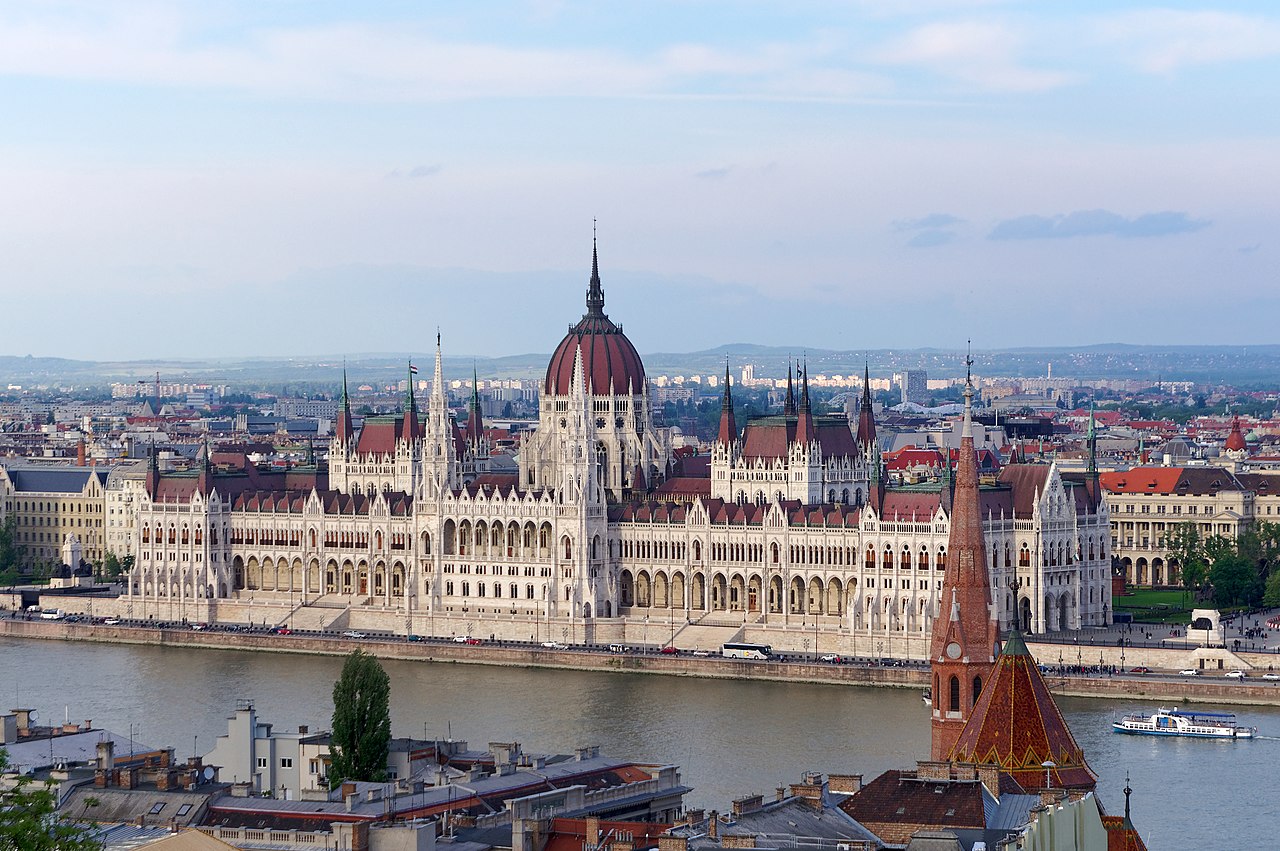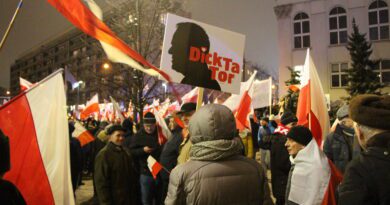Sovereignty or money: Poland is being targeted by “federals”

The alleged defenders of the “rule of law” are in fact very flexible in their approach to this term and in a completely embarrassing way. The EU elite, however, seemed to put faith in them, succumbing to disinformation from the Polish opposition
Rafał A. Ziemkiewicz
The dispute over the Disciplinary Chamber of the Supreme Court and, generally speaking, the “rule of law” in Poland is only a façade. In fact, it is all about the great plan of “deepened integration”, pushed by the ruling elites of the “old Union” and the layer of Eurocrats that has grown up in it in recent decades. That is, the creation of the “United States of Europe” announced years ago by Martin Schulz, in which the organs of the community will be given powers that will put them above national governments. Poland is not facing problems from any particular violations of the rule of law by its authorities, but from the fact that it stood in the way of implementing this vision. And finally, the situation was defined by the war in Ukraine, which for the European elite is primarily an opportunity, as Vice-President of the European Parliament called it, to “starve” Poland and thus force it into submission.
The implementation of the plan of “deepened integration” requires the introduction of the principle that the decisions of the European Council, the European Commission, and the Court of Justice of the European Union take precedence over the constitutions, governments, and judgments of the Member States. However, it is known – and the fate of the would-be “European Constitution” has proved this – that European societies do not want any deepening of integration, and in the legal manner provided for by the treaties, such a far-reaching change cannot be implemented. Moreover, the elites who opt for federalization are determined in their way of thinking, “deepened integration” is the antidote and a historic necessity, and it must simply be brought about, regardless of the rights and will of voters.
Thus, an attempt was made to “deepen integration” with small steps, using the fait accompli method. A special role here was played by the CJEU, composed, contrary to the ideas of the Polish state, mainly of politicians nominated by the “people’s” parties (the historical term “Christian Democrat” is nowadays rejected due to bad connotations) and the social-democratic ones. In subsequent judgments issued on the occasion of various minor disputes in the Member States (e.g. the pension rights of Spanish judges), the CJEU unilaterally considered itself supreme. This principle was supported by the European Commission and the European Parliament, and the courts of several smaller EU countries have also accepted this. In larger EU countries, however, these claims were usually rejected by judgments of national constitutional courts – this happened, inter alia, in Germany, Spain, Italy, and France. There has been a stalemate that has dragged on for years: targeted states do not try to dissuade Community authorities from repeatedly exceeding their treaty powers, but the judgments of the CJEU or penalties of the European Commission concerning them are ignored, the Tribunal and the Commission insist on their observance, but do not try to enforce them.
SHADOW OF MAGDALENKA
The situation in Poland is completely different, because here the “fedephiles” (as Jean-Marie Le Pen called the supporters of “deepened integration”) found willing partners for their game.
In order to clarify this situation, one has to go back to the “founding deal” of the Third Polish Republic, that is, to Magdalenka1. It was there that it was established that – in the event that the “citizen class” would not keep its promises and sought justice for the crimes of communism – the communist judiciary would remain free from any changes and would become a state within the state. Of course, the propaganda of the elites of the former opposition and the former authorities, who were at the Round Table negotiations (which at that time forged the absurd rule in which Poles had been stuck in for many years: “Judgments of the courts are not to be commented on”) kept the judiciary of the People’s Republic of Poland practically unchanged from the times of Stalin and under the power of the same community. This propaganda was seen as justified by the need for the independence of the judiciary from politicians. In fact, it was just as “fair” as if a swindler had been allowed to set up a card deck by dealing aces to himself and low-value cards to others, and then solemnly declaration that “we were playing fair from now on” would follow.
That the generals’ prudence was justified and well-thought-out, is evidenced by the judiciary farces, such as the trials of the criminals from the Wujek mine2, General Kiszczak3, or, especially, the trial extended for several years, which was to establish those responsible for the murderous shelling of shipyard workers on their way to work in December 19704, where the court performed an incredible auto-obstruction, summoning all the surviving participants of the street riots as witnesses; it was well over a thousand people, obviously incapable of contributing any valuable information to the case, and their physical interrogation turned out to be an unworkable ordeal – especially since one of the members of the judiciary died after many years and the remaining judges decided to start the whole process anew (in the end the case was discontinued when the “tried” General Jaruzelski died).
When PiS [the ruling party] made an attempt to crack down on this Magdalenka heritage, the legal state within the state became a separatist state. Figuratively speaking: the judiciary establishment has become a Polish Lugansk that self-proclaimed that it is not subject to Polish authorities and law, and invoked an external force – the Union – to protect its interests. The only difference is that in this case we are not dealing with territorial but corporate separatism. According to the leaders of the legal rebellion, judges in Poland are not “Polish” but “European” judges. Therefore, they are bound by the judgments of the CJEU (although they approach them selectively, as I will present in a moment), not Polish law, and they will not recognize the Polish Constitutional Tribunal and the Supreme Court since they lost control over these institutions.
WHAT DO THE JUDGES WANT?
What are the rebellious judges fighting for? The PiS reforms, without going into details, violated two pillars of the judiciary state: the fact that only judges themselves have the right to decide who will enter the profession, and that they are responsible only to themselves for all kinds of faults or crimes. The alleged threats to independence – resulting from the new method of electing the National Council of the Judiciary, which recommends candidates for judicial offices – are made up. In many Western countries, judges are nominated by politicians and the inability to dismiss one appointed before the end of their term of office is considered a sufficient guarantee of their independence (it is the Polish Constitution, written by Aleksander Kwasniewski and Tadeusz Mazowiecki, that gives such a possibility, and for 20 years this did not and what’s more – still does not arouse any vigilance of either the judiciary community or the Eurocracy).
The European Union’s response to the appeal of separatist lawyers was not entirely in line with the latter’s expectations, supporting them in only one case: in the matter concerning the Disciplinary Chamber of the Supreme Court which allegedly lacks guarantees of independence. Meanwhile, it is also, or even more important, for the legal community to expel the judges whose oaths were taken by the Polish president after 2015, on the basis that the “defective method of electing the National Council of the Judiciary” deprived them of their right to adjudicate; in the legal rebellion propaganda they are called “neo judges” and most of the judgments issued by the challenged Disciplinary Chamber concern cases of rebel judges who refused to adjudicate with “neo judges” or challenged their judgments on the grounds that they were issued by a person who was not a judge.
Such behavior in the propaganda of the judicial Lugansk is called “the enforcement of the CJEU judgment”. Meanwhile, it was precisely on this issue that the CJEU recognized the Polish constitution and the ruling of the Polish Constitutional Tribunal, which – by the way – examined this case before 2015 (in addition, before 2015, the CJEU ruled on three separate occasions that in Poland the Constitution of the Republic of Poland is above EU law, except in areas where we have specifically renounced sovereignty in favor of the Union in the treaties – the judiciary is not one of these areas): a judge is a judge because his oath was taken by the President of the Republic of Poland, and the status of the National Council of the Judiciary, which only recommends candidates for appointment, even if there were reasons to question it, cannot constitute the basis may be a reason for questioning the status of a judge.
The alleged defenders of the “rule of law” are in fact very flexible in their approach to this term and in a completely embarrassing way. The EU elite, however, seemed to put faith in them, succumbing to disinformation from the Polish opposition. During the proceedings of successive anti-Polish resolutions in the European Parliament, it could repeatedly be heard that “80% Polish society supports the opposition”. This obvious manipulation of the politicians of the Civic Platform and the Left (presenting support for the opposition as the equivalent of the percentage of Poles declaring support for EU membership) was clearly taken at face value by the “fedephiles”, expecting that frightening Poles with the loss of money would allow Donald Tusk to be placed on the Polish throne quickly and easily, just as Italy and Mario Monti once did. Here, too, we can see the similarity of the judiciary state in Poland joining the “United States of Europe” to Russia’s annexing of the self-proclaimed republics in Ukraine.
THE GRILLING CONTINUES
It is a great mystery whether the recent information about the alleged “unblocking” of funds for Poland proves that the Eurocrats’ faith in the possibility of a real removal of PiS from power by a chronically inept opposition has weakened, or whether PiS collapsed when it turned out that the EU does not intend to acknowledge our merits in supporting Ukraine and, on the contrary, considered the fact that the costs of war are falling on us as a unique opportunity to “starve” us.
There is no legal basis for linking the issue of funds, including those from the National Reconstruction Fund, with any “milestones”, such as the liquidation of the Disciplinary Chamber. Its only basis is the consent for this, signed at the time by Mateusz Morawiecki. His government then showed shameful naivety when, unsure whether it would get the money, it had already launched a huge campaign of promises about what it would spend it on. Interestingly, the stupidity of this government (it cannot be called otherwise) turned out to be incurable, because the situation has just repeated. First, Müller, the government press secretary, triumphantly announced the release of funds by the EUR, then promises were immediately made about what they would go on, and then EC President von der Leyen gave us the finger, announcing with a sad letter that PiS would not get any money until it proved (!) that it genuinely fulfilled her demands.
Therefore, it seems as though there is no breakthrough. There is still grilling and “starving” of Poland from the side supporting the “European judges” Eurocracy, and on the other spectrum – consistent adherence by the rulers of Poland to the principle of announcing loudly and boldly, so as to please their voters, that they will defend Polish sovereignty. And subsequently, they will silently capitulate.
This article was published in May 2022 in “Do Rzeczy” magazine.
1 The talks in Magdalenka, often referred to as simply “Magdalenka” were negotiations that preceded the Round Table Negoatiations concerning the transformation of Poland from the communist regime to [alleged] democracy
2 On the night of December 12-13, 1981 martial law was imposed throughout Poland. Along with hundreds of others, the chairman of the “Solidarity” movement in the “Wujek” mine, Jan Ludwiczak, was arrested. Miners working on the night shift were witnesses of the arrest and they decided to strike calling for the lifting of martial law, the release of Ludwiczak and all activists imprisoned on the night of December 12-13. The authorities, refusing to make any concessions, decided to use force against the miners, who firmly refused to end the strike. On December 16th, troops and the Citizens’ Militia broke into the mine through the wall knocked down by tanks. The strikers defended themselves by throwing stones and bolts at their attackers. As a result of the opening of fire on defenseless civilians, six people died on the spot, and three more died later in the hospital. In 2009, twenty-eight years after the pacification of the mine and twenty years after the fall of communism, the Supreme Court confirmed the judgments of lower courts, which sentenced 12 Military Police officers to 3.5 to 6 years in prison.
3 Czesław Kiszczak was the communist-era interior minister and general of the Polish People’s Army. He played a key role in imposing martial law and suppression of the “Solidarity” movement. He is widely considered to be one of the biggest criminals of communist-era Poland along with General Jaruzelski.
4 The December 1970 protests occurred in northern Poland between 14–19 December 1970. The protests were sparked by a sudden increase in the prices of food and other everyday items. Strikes were put down by the Polish People’s Army and the Citizens’ Militia, resulting in the death of at least 44 and more than 1,000 wounded.



